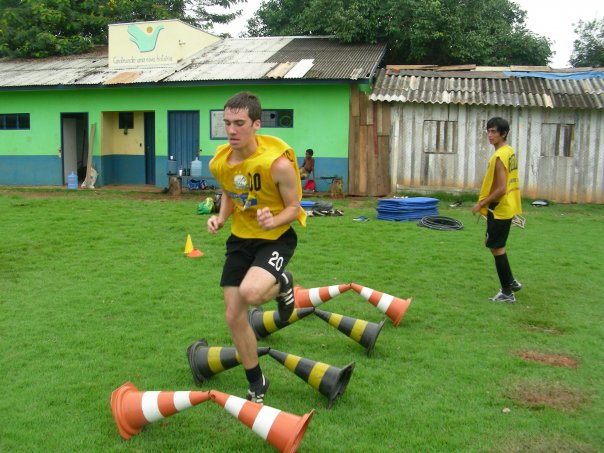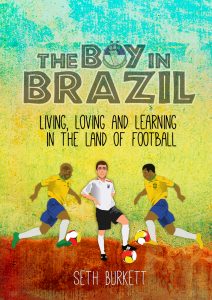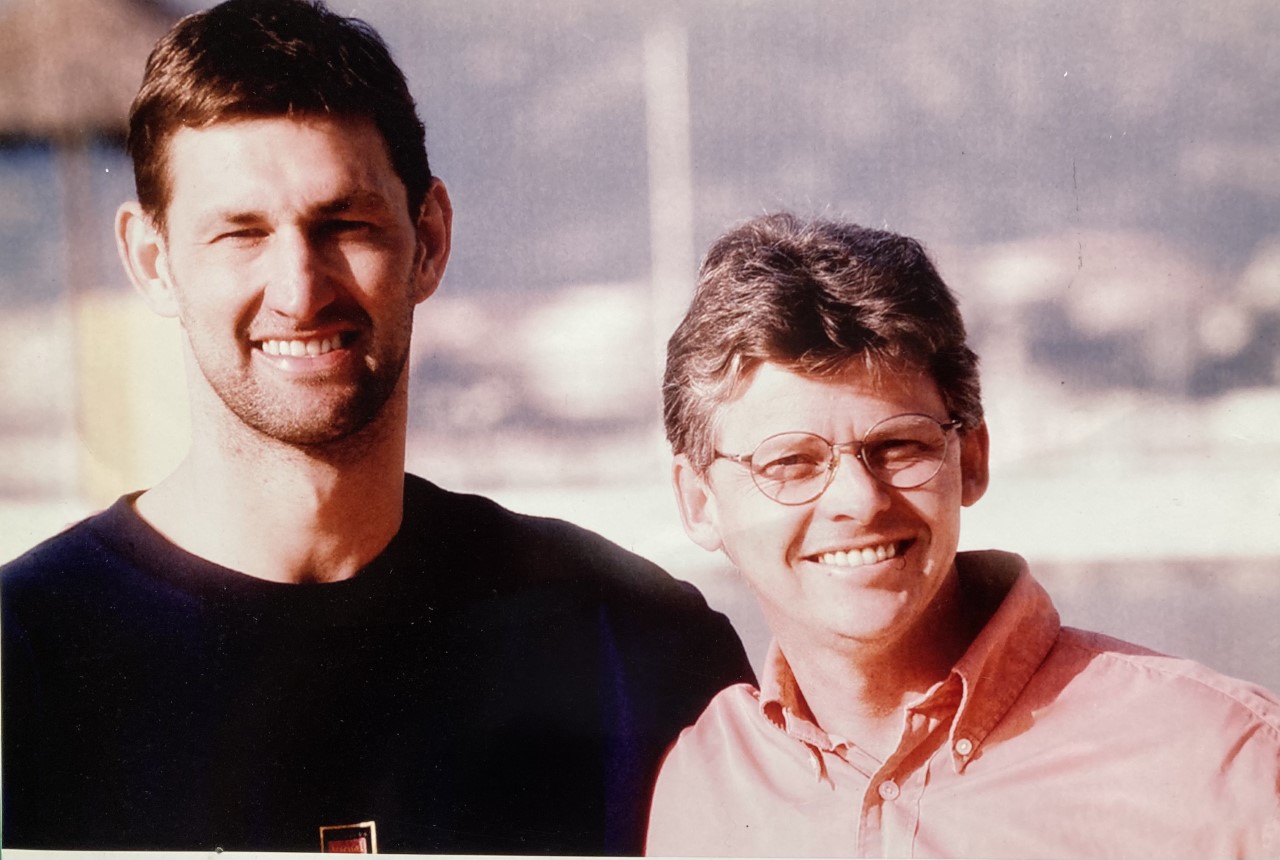The Boy in Brazil was published in 2014. It went on to be shortlisted in the Best Football Book category of the British Sports Book of the Year. The book details Seth Burkett’s experiences of being the only Englishman playing professional football in Brazil and has been described as ‘a remarkable, funny account.’ You can read an extract from the book below. For more details, including how to buy the book, click here.
Sorriso didn’t exist until 1985. Created out of cleared rainforest in central Brazil, it soon attracted numerous people who were not only enticed by the cheap land on offer, but also the cheerful city name. ‘Sorriso’ translated as ‘smile’, though the name selection was not intentional. In fact, it was a reference to the Italian immigrants who only cultivated rice in the area. ‘So riso’ means ‘only rice’ but the words ended up being merged to form the final name of the city.
The terrain of the area was exceptional for cultivating crops, some of the flattest and most fertile land in Brazil. Over the years, it had specialised in the production of soybean, and developed to become the national capital of agribusiness. It was now the biggest producer of soybean in the World, which is how many of the 70,000 Sorriso residents came to make their riches.
Deep in the heart of Brazil, and South America, Sorriso was some 1,500 miles from Rio and the same from Manaus in the Amazon forest to the North (where England, it would turn out, would play Italy in their opening game of the 2014 World Cup finals). Whereas Salvador was located next to beautiful long, golden beaches, Sorriso could not have been further from the coast. Indeed, it would take a two-day car drive to get to the nearest beach.
The club, Sorriso Esporte Clube, had both a youth team and a full-time professional senior team, their Mato Grosso state leagues running parallel from late January to April. From May to December, the national leagues took place in but featured only the top ranked 100 clubs, the top 20 clubs comprising such giants as as Flamengo and Fluminense from Rio and Corinthians and Palmeiras from Sao Paulo forming Serie A.

That meant another 700 professional clubs in the country left with no fixtures between May and December, so states often organised their own cups for part of this time. The Mato Grosso cup took place between September and April. SEC were ranked 264th in the country by the Confederacao Brasileira de Futebol – the Brazilian equivalent of the Football Association. In status, it was probably around the same level as the Conference in England.
Finally I was getting on a plane to see and experience all this for myself. I flew via Lisbon to Brasilia, where I felt lost as I searched the airport – so big, so foreign – for my internal flight to Cuiaba, the nearest airport to Sorriso. This was not ideal considering that, after the Brazilians had taken so long to get us through passport control, I was left with just 45 minutes to catch my connecting flight.
It suddenly occurred to me that I had never been in an airport on my own before, let alone in a foreign country on the other side of the World. I suddenly felt my youthfulness, how exposed I was to anyone who could quite easily take advantage of me.
My fearful expression must have been evident as I was approached by a Swedish man. He was a gymnastics coach, and was in Brazil to improve his own coaching knowledge, having previously worked with the United States gymnastics team. He had been to Brazil regularly and was comfortable in the airport. He kindly pushed me in the direction of the line for my connecting flight. In another kind twist of fate, the queue wasn’t too long, just tediously slow moving.
After a frustrating wait I made it to the front where I was brusquely informed that I was in the wrong queue. The airport attendant directed me to the actual queue I needed to be in. I was sweating quite heavily now, my heart bouncing around my chest. I had 15 minutes left until take-off. Terrible thoughts flooded my head – what if I missed the flight? I’d lose my contract with Sorriso. I’d be stuck in Brazil, unable to afford a flight home. What was that film? Oh yes, The Terminal.
I needn’t have worried. I was in Brazil after all. I reached the gate with two minutes to spare after being fast-tracked through the correct queue. The flight took off half-an-hour late, which I was coming to learn was actually pretty good when it came to Brazilian timing. It was only when I was in the air that I realised I had no clue who was picking me up or how I was actually getting to Sorriso.
The question, whilst troubling, was not as disturbing as the flight. I’d never been in an aeroplane that vibrated so much. It was like we were going through permanent turbulence. Overwhelming relief flooded through me when the wheels touched down in Cuiaba. I stepped out of the potential death-trap into torrential rain, a lovely feeling in the oppressive heat.

The airport building was a lot less intimidating than the one in Brasilia. It was tiny, more like a reception area in a hotel. There was just one carousel, and my suitcase was the first to appear. Optimistic, I collected it and headed to where I hoped Emerson would meet me. A man approached me.
‘Michel?’
‘No, Seth’, I replied. ‘No, no, Michel’.
‘You, Sorriso?’ I asked, desperately trying hand gestures. He nodded, before telling me in broken English that he was picking up a Michel from Portugal. I think that was what he meant anyway.
‘No. Me. Seth. Sorriso. Play futebol.’ I was getting frantic. This appeared to be the man who was supposed to be taking me. It just a shame that he wasn’t aware of it. He excused himself and embarked on a long, long phone call. My heart was doing somersaults. After about 20 minutes he nodded to tell me that I could jump in with him. We just had to wait for Michel.
Finally, a muscular teenager around six feet tall stepped into the airport reception. What was most striking about him was not his black curly hair, but more his choice of attire. Michel was obviously proud of his body, and had made a conscious effort to emphasise his bulging arms by donning a bright pink vest, together with tight jeans and running trainers.
Undeterred by his episode with me, the man approached Michel with a forceful, outstretched hand and a smile. This was definitely the boy he was supposed to be picking up. He motioned for both of us to follow him into a small, white 1980s Fiat Punto. I still wasn’t sure that this was who was supposed to be picking me up, but I was too tired to care and grateful to have some company.
I sat in the back and attempted to make sense of the conversation that the man and Michel were having. It appeared that he was the chairman of Sorriso and had invested a great deal of money into the club. He really should have put a bit of money aside to invest in his car, whose age was no secret thanks to the excessive rust.

The Chairman seemed a self-important man. He talked loudly and took little notice of what Michel was saying. He was on the phone for most of the journey. I had decided to sit behind Michel. Although the Chairman had seemingly played football in the past – he claimed to have played for Corinthians, though I was sceptical – he had developed a pot belly which was out of proportion to the rest of his body. His car seat was tilted quite far back, giving his stomach just enough room to fit under the steering wheel. I guessed him to be around 40 years old but had no Portuguese to ask him any questions.
As a break from the self-importance, the man stopped the car and paid for a buffet for the three of us. It was here that I was able to talk to Michel, who I discovered was a goalkeeper, one of Anderson’s players, and who had previously played in Brazil for Emerson. Michel had a friendly, gentle demeanour and was softly spoken.
Feeling well-fed and watered, I dropped into a deep sleep back in the Punto, which was frequently slowed by bouts of astonishingly heavy showers. We even had to come to a halt a couple of times to wait for the apocalyptic rain to relent. Anderson had told me that the journey would take ‘a few’ hours. I believed him – Sorriso is in the same state as Cuiaba after all. I had neglected to take into account that Mato Grosso, like many of the other Brazilian states, covered a vast area in a country seven times bigger than the United Kingdom.
After eight hours of driving on dusty, pot-holed roads, with views of nothing more than expansive fields of crops, punctuated by a settlement every now and again, we came to a small city. We drove through a dusty favela at the edge of an industrial estate, filled with box houses created from whatever materials the owners could find. On the edge of the favela we stopped at what appeared to be a garage, I presumed to fill up with petrol. It turned out that ‘Casa dos Filtros’ – literally ‘House of Filters’ and indeed a former garage – was my new home.
The Chairman gestured for us to get our suitcases and follow him and tentatively I obeyed. Casa dos Filtros had a big up-and-over front door and a corrugated iron roof. The door led into a large communal area and kitchen. There was a long bench running from one wall to the other, and a television opposite this. I wondered why there was a toilet brush on the table. The house was empty. It was late afternoon and the team was presumably training.
We were taken to a room on the left, where the Chairman told us to leave our suitcases. The room was a little bigger than my one at home – but this one I had to share with five Brazilians (or four and Michel). Three bunk beds were shoved around the perimeter of the room, leaving an area of about four square metres in the middle. The windows had bars covering them, though one of the windows had a bar missing.
The most notable object in the room was the large air conditioning box in the top corner of the room, which had been turned up to full in the absence of the residents. It felt like a refrigerator in there. Quotes, printed on paper in large font, were pinned to the walls of the room and I wished that I knew what they meant. A couple were clearly marked as being Biblical and I suspect the others were motivational.
The concrete bathroom was a collection of shared, open showers, three toilets with no doors and a urinal under a washing line. Shower curtains hung limply where the toilet doors should have been in a vain attempt to preserve the user’s dignity, though one toilet lacked a curtain and was utterly exposed. This same toilet was missing a toilet brush, and I couldn’t help but think the brush on the dining room table was in the wrong place.

And was that brush needed in that toilet. Flies were hovering around what the last user had deposited on the seat and the other two toilets had urine covering the floor. Deciding that this was the lesser of two evils I carefully tiptoed in to relieve myself. It seemed my personal hygiene was rapidly about to go downhill. We got back into the Chairman’s car and headed across town.
The beautiful scenery that was so overwhelming in Salvador was absent from the Sorriso area. Instead there were miles and miles of plain, boring soybean fields, stretching as far as the eye could see. There remained uncleared patches of rainforest around the outskirts of the city and not until you got 10 minutes out of the place was there much more foliage, replete with tropical birds of all colours of the rainbow.
The city of Sorriso itself, however, was rather plain. Nice, but not exactly inspiring. Like many of the newly built areas, such as the notoriously bland Brasilia, it was a bit too manufactured, almost perfectly square. At the centre were two parks, filled with ice-cream vendors, cafes/diners known locally as luncheonettes and benches, along with the newly built shopping centre, cinema and television studios complex, providing the social hub of the city. When the football stadium and churches weren’t open of course.
The Chairman parked his car at the Estadio Egidio Jose Preima, home of Sorriso Esporte Clube, and we walked through the entrance to see our new team being put through their paces by Emerson.
The stadium had been built on the edge of the city, and it looked out on to gentle rolling hills punctuated by the odd house. There was only one large concrete, terraced stand, with no seats as such, than ran the length of one side of the ground and which I was told could accommodate around 5,000 people. A roof spanned across thirty metres at its centre but the rest of the ground was open. From the stand, the handful of supporters watching the training session could see the impressive view. The substitute benches were opposite the stand, but the changing rooms were hidden by the hill.
We entered the ground at the centre of the stand, coming out at the halfway line. A commentary box sat above the walkway, with the message ‘Obrigado por prestigiar o esporte’ – thank you for honouring the sport – painted across it. A large wired fence, combined with a running track, separated the stand from the pitch. I could just imagine the fans jumping on this fence, going crazy as I scored yet another match winner for their beloved team.

Closer inspection of the pitch put my daydream into jeopardy, I wasn’t sure how I was going to be able to play on it. There was a distinct lack of grass. Where there was grass it was knee high, wispy rather than thick but knee high nevertheless. There were dusty patches of earth dotted all around. The only areas that had grass at an acceptable height were the penalty areas.
There were 31 players training and I would find out they were all ages from 13 to 18. That was the way here, it seemed; if they were good enough and strong enough, they could compete with players more senior. Emerson had them playing a match, and he bounced over to me and Michel, who would take the squad up to 33, of whom 28 would end up going to the Copa Sao Paolo.
‘Ah, Sefi!’ he said, approaching me first, firmly shaking my hand with a broad beam across his face, showing his pearl white teeth. I noted the England cap he was wearing, presumably for my benefit. Emerson cut a porcine figure, stocky if not fat. His calf muscles were not far off the girth of my torso.
Emerson had been a good player, also a left back, and had played at a high standard, with Bahia of Salvador in the 1980s. Lots of people recognised him and he enjoyed the fame.
He had even been capped by Brazil at Under 23 level, and had accumulated enough money from his long spell in the Brazilian top flight to drive around in the biggest, shiniest, whitest Range Rover I’d ever seen. The healthy tan that he sported blended in perfectly with his bleached blonde hair, taking the attention away from his snout-like nose. His smile was infectious, his voice booming and his personality endearing. I immediately felt welcome.
Back in Casa dos Filtros my teammates stared at me inquisitively. They had never met an English boy before. They introduced themselves before dinner, but were unsure of how to build conversation. I had learned a few words in Salvador, and I tested one out to try and befriend them.
‘Pinto,’ I said – a slang word for penis – and they roared approving laughs. Suddenly they were jabbering at me from all angles, encouraging me to say more rude words in Portuguese. I acted the parrot, copying all that I heard to the delight of my onlookers.
Lucas, who I would find out was a defender, was especially vocal in encouraging me to say phrases. Although he was of slight build, he had a mean face. At some stage in his life he had decided that his curly hair gave off the wrong impression, of being soft, and he had covered his arms with tattoos to try and alter the perception. Despite this he couldn’t have been more hospitable, and he really eased my transition into the house. Unfortunately he couldn’t get a grasp of my name.
‘Jeff?’ he wondered…‘Jeffy? Sefi?’ Sefi would do, at least that had an S in it. I had encountered this problem in Salvador. It seemed that Brazilians just couldn’t pronounce my name.
After my little show, the Chairman arrived and encouraged me to go along to a local game with some of my teammates. Andrei was Sorriso’s star striker, and was one of the few players who actually lived in the city. On top of this he could speak a little English. Chandler and Viniscius – the team’s central defenders and two of my new roommates – joined us.
Viniscius had the same sort of porky frame as Emerson and also had a little pig tail growing out of the back of his head to complete the illusion. He appeared loud and confident. Chandler was taller, quieter and quite obviously very fashion conscious, perhaps more so than Viniscius. Rumour had it that he had served a prison sentence, though nobody knew for what. Perhaps Viniscius put the rumour round himself to frighten us, or me at least.

Andrei drove us to the stadium I had been at just a few hours before, and I took my seat alongside a few hundred other spectators. I was informed that I was at a game where the teams were competing to be the best amateur team in Sorriso. Andrei pointed out the No. 8 for the team in blue and white. ‘Watch him… He very good.’
Apparently the No. 8 had had trials with Portsmouth but I didn’t really get the chance to assess his performance as quite quickly he managed to get himself sent off for what the referee deemed an unacceptable shoulder barge. The No. 8 subsequently deemed it unacceptable that the referee should send him off for such an innocuous tickle of his opponent’s shoulder, and reacted by pushing the referee several times. The referee eventually fell to the ground, sparking havoc. Both teams piled in, with punches being thrown everywhere. In the corner of my eye I made out the linesman from the far touchline. He was hitting one of the players with his flag. Someone tried to stop him and he turned around and jabbed them in the midriff with his flag. The referee, now back on his feet, was helplessly tooting his whistle. Nobody was listening.
Somehow the madness fizzled out, and the No. 8 was ejected from the pitch. The game re-started only to stop a matter of minutes later. The No. 8 had re-emerged with a beer in his hand, still wearing his match shorts but nothing else. Carrying his beer in one hand, his boot bag in the other, he embarked on in an infuriatingly slow walk across the pitch and prevented any play for another two minutes.
Welcome, Sefi Burkett (and they would have some fun with my surname too), to the wonderful world of Brazilian football.








Leave A Comment